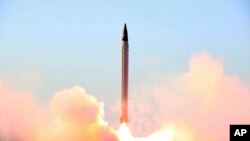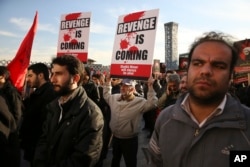The U.S. response to the rift in relations between Saudi Arabia and Iran may be influenced, in part, by a U.S. desire to see the Iran nuclear deal implemented, according to analysts studying the crisis.
"What is paramount is for [U.S. President Barack] Obama to protect the Iran deal," said Karim Sadjadpour, an Iran analyst with the Carnegie Endowment for International Peace.
In a Friday forum, Sadjadpour said there is currently not a clear U.S. "siding" with Saudi Arabia, whereas in the past, the U.S. had been in "lock step" with the Gulf kingdom against Iran. That change has angered Saudi officials.
“If [the Iran nuclear deal] is at the top of your agenda," Sadjadpour said, "that means that the administration's perspective is that they are going to try to do everything they can to de-escalate tension with Iran."
Secretary of State John Kerry said Thursday that nuclear negotiators could be "days away" from implementing the agreement, known as the Joint Comprehensive Plan of Action. Launching the agreement would be the culmination of nearly two years of intense negotiations among Iran, the U.S. and other world powers.
Sadjadpour said a U.S. goal is to hold back on penalties against Tehran that could potentially trigger a response that would unravel the deal.
Regional resolutions
On Monday, State Department spokesman John Kirby said the U.S. had "expressed particular concerns" over Saudi Arabia's execution of Shi'ite cleric Nimr al-Nimr. He also said the U.S. condemned the attacks on Saudi diplomatic missions in Iran that were launched in response to the execution.
"Ultimately, solutions to problems in this region must come from leaders in this region," Kirby added.
Analyst J. Matthew McInnis of the American Enterprise Institute said the Saudis are concerned about what they view as a U.S. shift that began with the Iran nuclear talks — "not so much to fully pull away from Arab states," McInnis said, "but to rebalance in Iran's favor."
He added that the U.S. is now trying to allow regional states more room to work out issues for themselves.
Similar sentiments were echoed by Frederic Wehrey, a senior associate in the Middle East program at the Carnegie Endowment for International Peace.
"One of Obama's visions for this region, at least in the Gulf, is equilibrium," Wehrey said.
Fear of empowered Iran
Analysts say there are ongoing concerns among U.S. Gulf allies that Iran would be empowered by the sanctions relief it would receive as a result of compliance with provisions in the nuclear deal. They fear an empowered Iran could be destabilizing for the region.
The Saudis, and to a lesser extent the other Gulf Cooperation Council countries, are "paranoid" when it comes to Iran, said analyst Simon Henderson of the Washington Institute for Near East Policy.
"Saudi Arabia is the most important country on its side of the Gulf, and Iran is the most important on its side," Henderson said.
Saudi Arabia severed ties with Iran after protesters stormed the Saudi missions in Tehran. In Iran, mass protests over the cleric's execution have continued.
There are signs, however, that the tension may be starting to abate.
Kerry said he had spoken to his counterparts in Iran and Saudi Arabia and received assurances that they would not allow their rift over the Shi'ite cleric to affect their willingness to work cooperatively to help resolve Syria's crisis.
Saudi Arabia, Iran and the United States are part of the International Syria Support Group. The group was instrumental in crafting a plan for a U.N.-mediated political transition in Syria. The U.N. intends to launch an initial meeting on the plan with the Syrian government and opposition this month.
Also, in an interview with The Economist, Saudi Deputy Crown Prince Muhammad bin Salman said a direct war with Iran was something that Saudis "do not foresee at all."
He said Iranian escalation had "already reached very high levels" and Saudis would try hard "not to escalate anything further."






